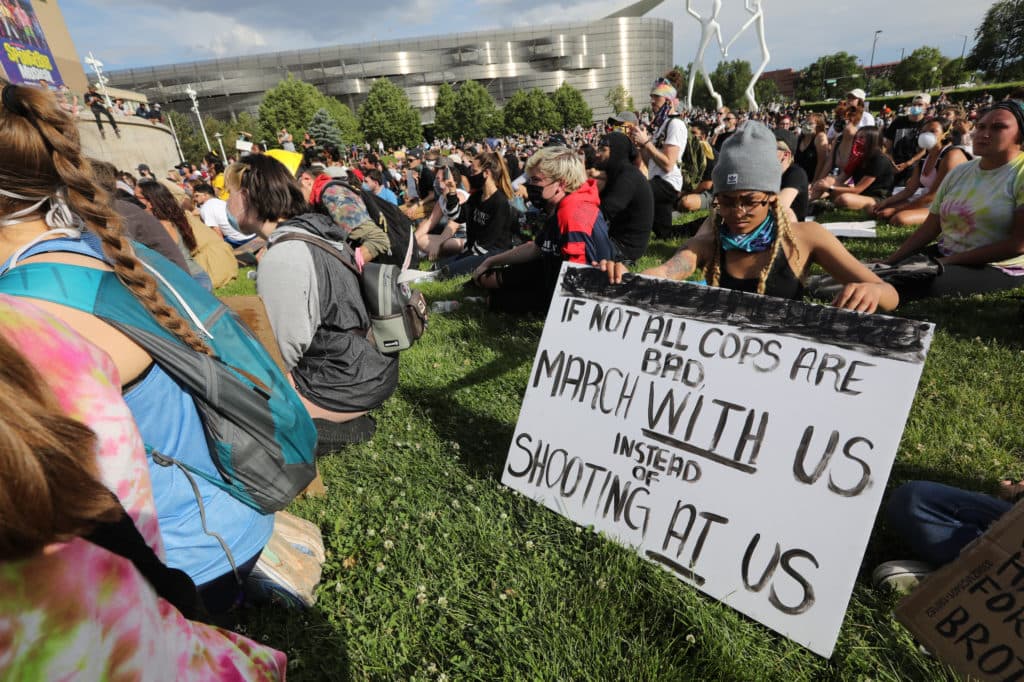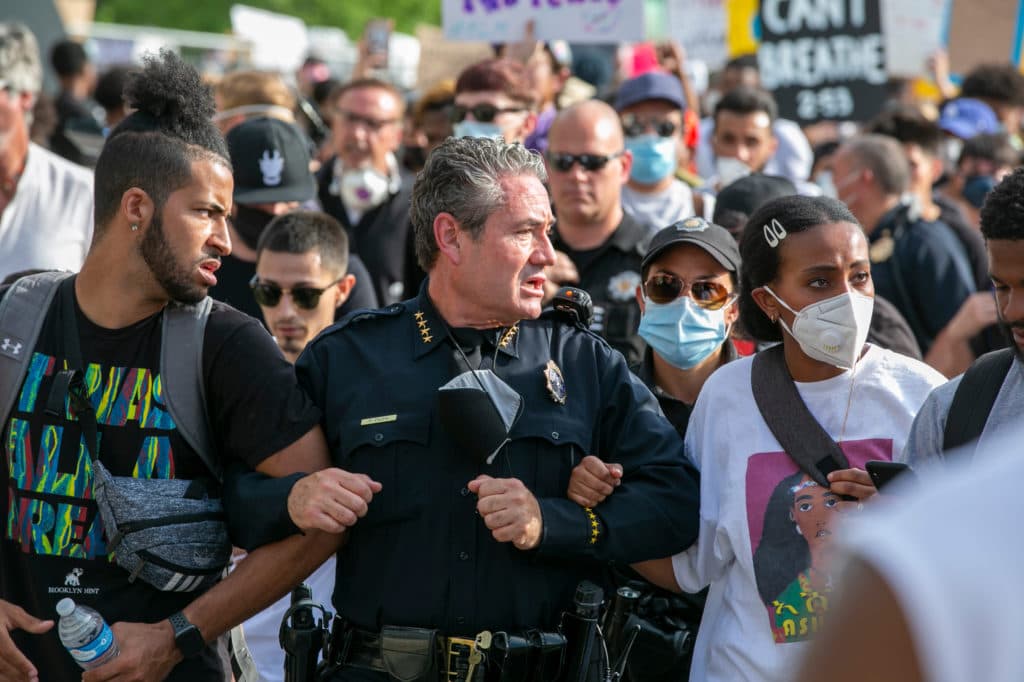Denver's police chief walked arm-in-arm with anti-racism protesters Monday during a peaceful march that contrasted with several nights of clashes between his officers and demonstrators.
"We will stand with you, and we will walk with you," Denver Police Chief Paul Pazen told a crowd at Civic Center Park before joining the march to a park near the Denver Performing Arts Complex.
One demonstrator asked about an Instagram post that showed three Denver police dressed in body armor with the caption "Let's start a riot." Pazen, who called for an Internal Affairs investigation into the post earlier on Monday, said he was upset by the photo.
"I was hurt by the post. We need to bring the temperature down," Pazen said.
While he marched with one group of demonstrators, a rally organized by college students was held with equal passion and peace on the steps of the Capitol.
Shayana Dabney, president of the Black Student Union at Colorado State University Pueblo, was among the speakers on the Capitol steps.
"I'm ultimately hoping that people realize that for all the negativity, that it needs to be broadcast that people want positive change," Dabney said in an interview. "And that's what we're out here working for."

Shortly before the protest kicked off, President Donald Trump took to the Rose Garden and threatened to send U.S. military troops to states that "(refuse) to take the actions necessary to defend the life and property of their residents." Gov. Jared Polis had called in about 100 members from the state's National Guard on Saturday to help patrol downtown Denver.
Denver resident and health care worker Gene Richardson attended the Capitol demonstration with his 4-year-old daughter who carried a sign that read "I matter too." Richardson had heard Trump's comments about "taking back" the streets across the country.
"I feel like they're not his to take back. The whole country belongs to the people," Richardson said.
In a statement from Mayor Michael Hancock spokesman Mike Strott, Denver's mayor pushed back against the president's call for additional force.
"Denver police, our mutual aid partners and a small contingent of Colorado National Guard have been working for the past four days and nights to support peaceful demonstrations in Denver," the statement read. "They have worked long hours under difficult conditions, especially as day turns to night. But there is no need for the deployment of U.S. troops to maintain order in our city. The president's threat to deploy federal troops is counterproductive and will only stoke the potential for worse violence and destruction. Denver is not Little Rock in 1957, and Trump is not President Eisenhower."
At the Capitol, Caleb Negussie, who will be a senior next year at Rangeview High School in Aurora, stepped up when a call went out for people under 18 to take the mic.

"The only way they will listen to us is if we show up in masses like we have today. We've tried for years to be peaceful. But what's happened? We're still out here. Where was the civility for Trayvon Martin? Where was the peace for Eric Garner? Where was the nonviolence or George Floyd?" Negussie said. "I just hope in 10 years, when I'm 27, I don't have to be out here protesting."
The organizers struck a contemplative tone from the start, placing on the Capitol steps photos of people such as Breonna Taylor, a 26-year-old black emergency room technician who was shot and killed in her Louisville, Kentucky, home by police who had used a battering ram to crash into her apartment. Police reportedly believed a drug suspect had used her apartment to receive packages.
Demonstrators lit candles and placed flowers on the shrine created on the steps. At one point, many in the crowd of at least 1,000 took a knee and observed a long moment of silence -- a contrast to the explosions and shouts during the previous nights.
Organizers at the Capitol thanked Hancock for pushing the city's curfew back an hour, from 8 p.m. to 9 p.m., saying that would allow people to get home safe -- a signal that at least some marchers were intending to obey the curfew.
Hours later, hundreds were still out after curfew.
Bobby Cuomo lives in Aurora and was out after curfew. "Why past curfew? Why have curfew? You take the cops away and we don't need a curfew," said Cuomo, who has been protesting every night since they started. "Anytime anyone is doing anything violent. You know who's stopping it? The protesters."
As late as 10:30 p.m., protesters were still demonstrating by lying face-down on the ground, marching from place to place and peacefully lighting fireworks near the Capitol.
The Denver City Council canceled its weekly legislative meeting on Monday at the City and County Building across the park from the Capitol. State legislators had left for the day by 4:45 p.m.













